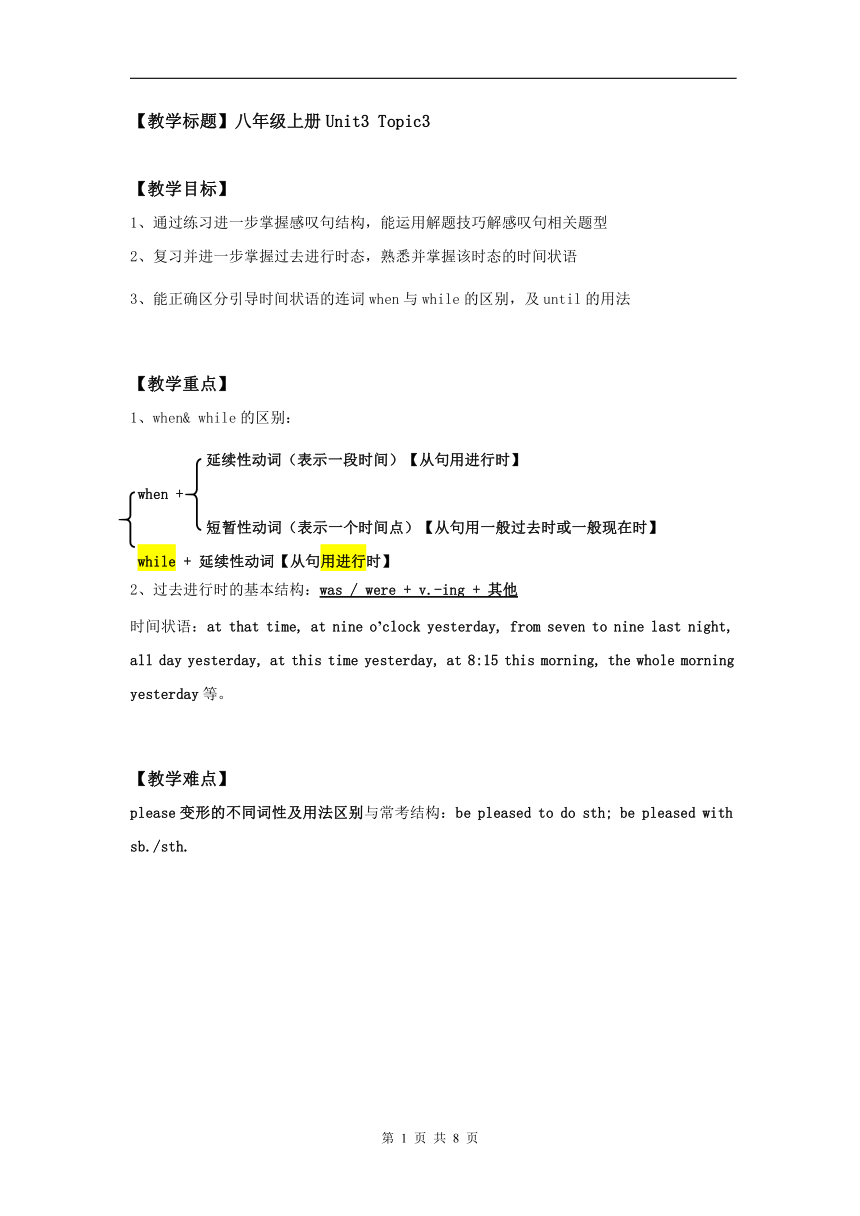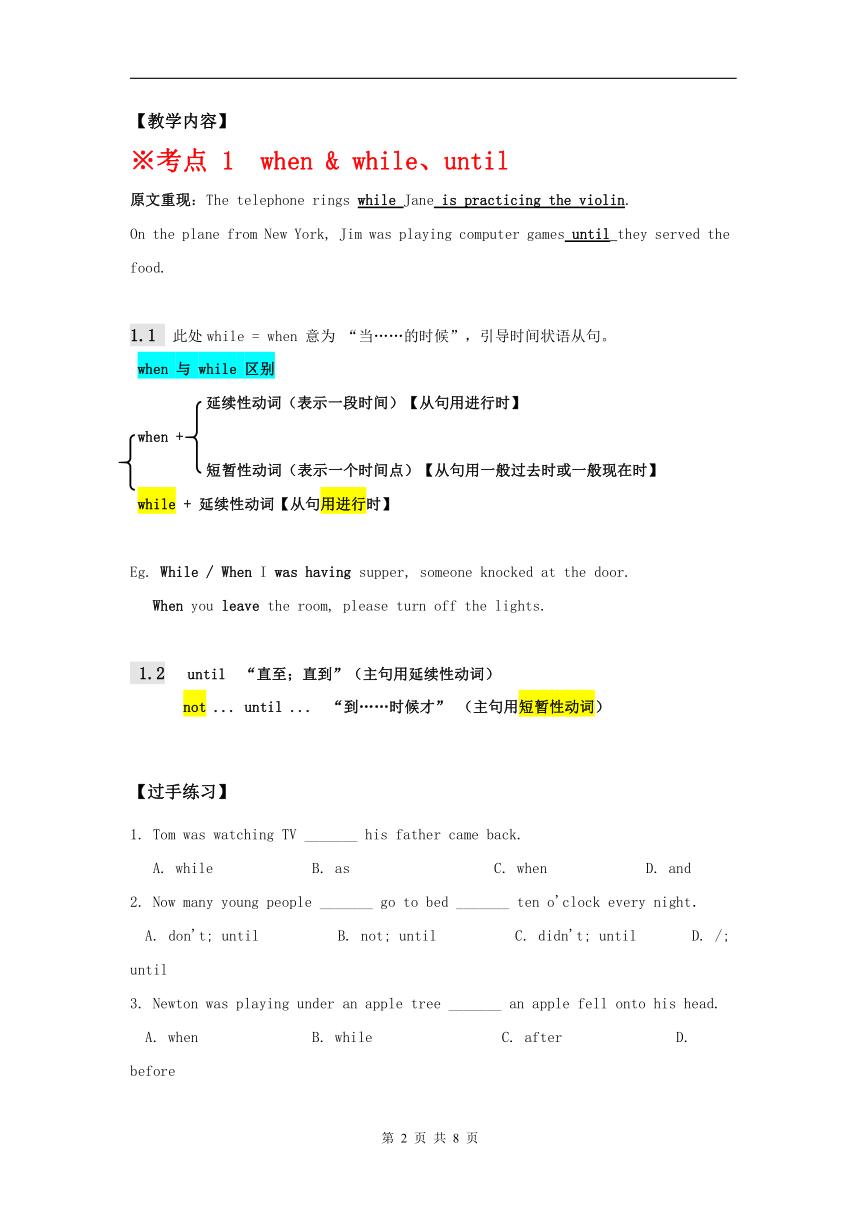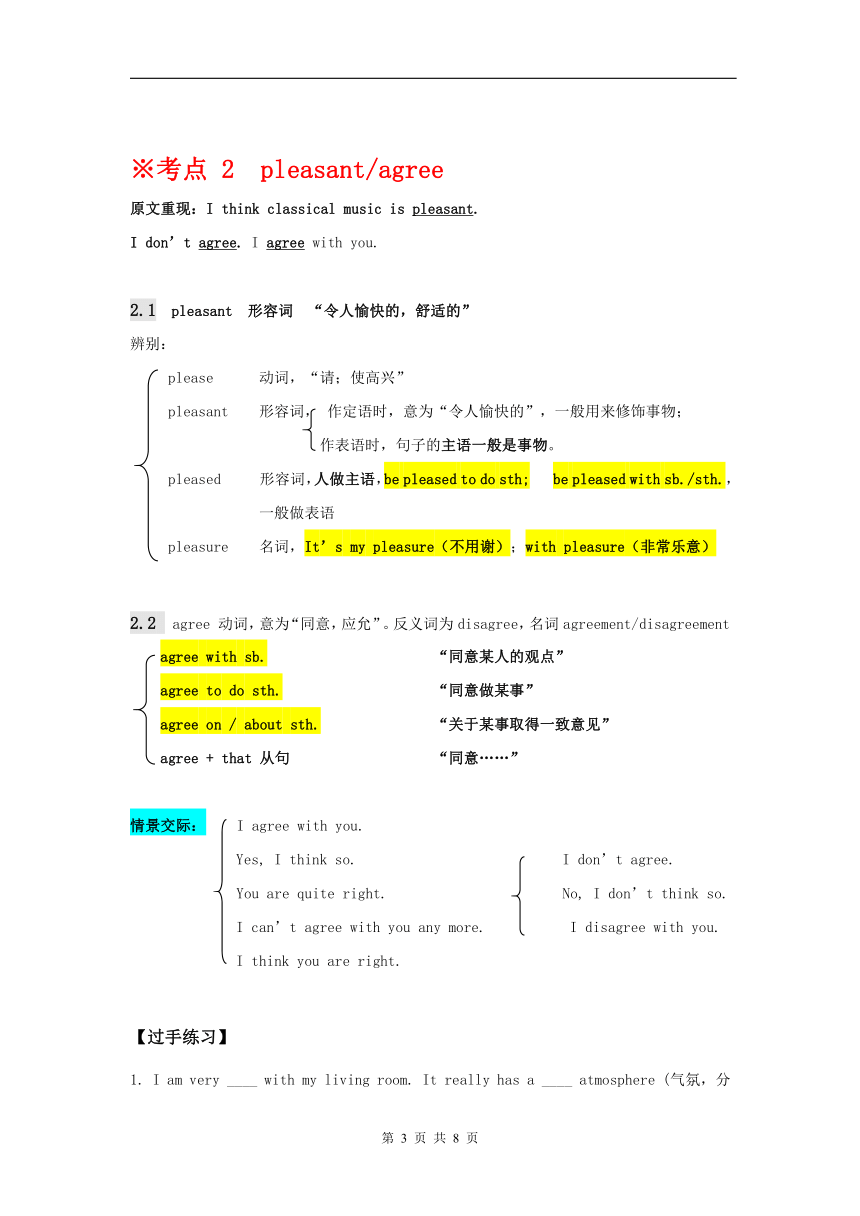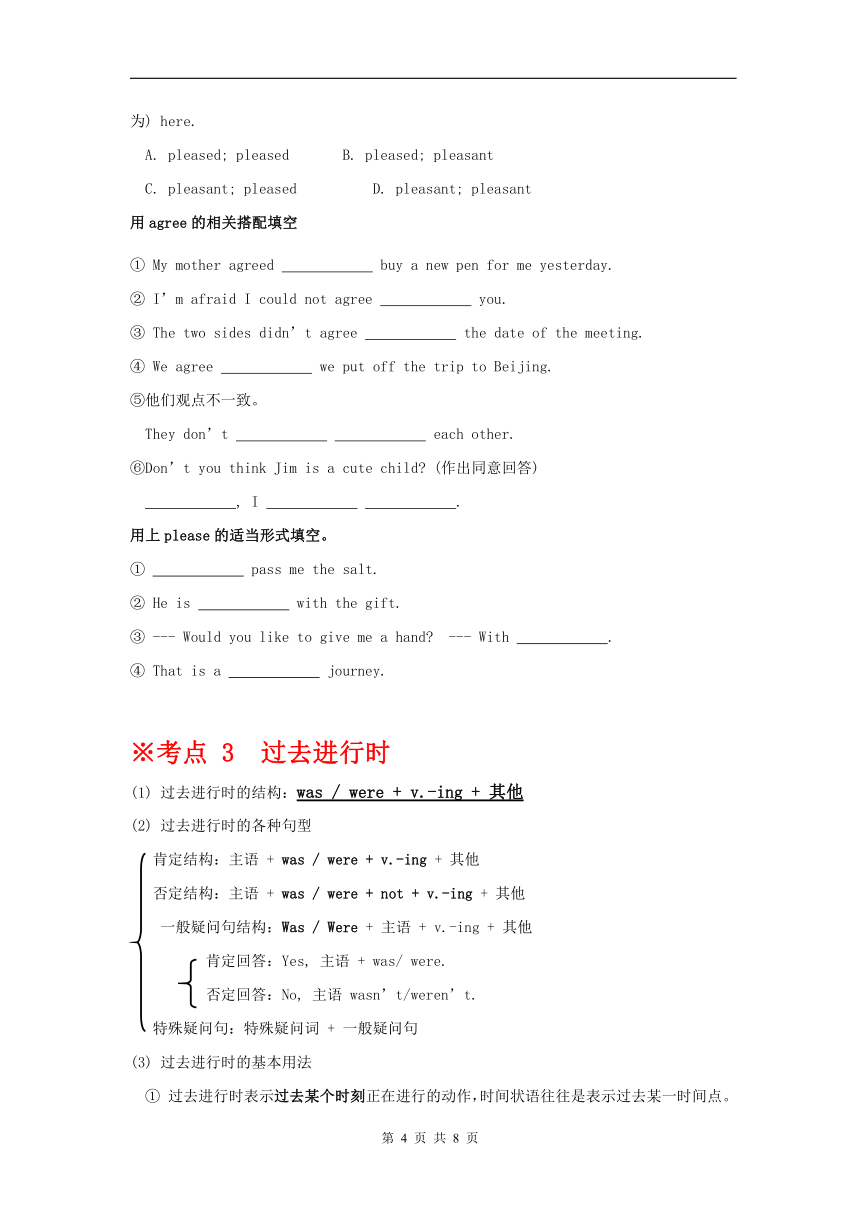重庆市仁爱版初中英语八年级上册 Unit3 Topic3 What were you doing at this time yesterday 重要知识点及练习(无答案)
文档属性
| 名称 | 重庆市仁爱版初中英语八年级上册 Unit3 Topic3 What were you doing at this time yesterday 重要知识点及练习(无答案) |

|
|
| 格式 | zip | ||
| 文件大小 | 58.8KB | ||
| 资源类型 | 教案 | ||
| 版本资源 | 仁爱科普版 | ||
| 科目 | 英语 | ||
| 更新时间 | 2023-01-03 10:48:27 | ||
图片预览




文档简介
【教学标题】八年级上册Unit3 Topic3
【教学目标】
1、通过练习进一步掌握感叹句结构,能运用解题技巧解感叹句相关题型
2、复习并进一步掌握过去进行时态,熟悉并掌握该时态的时间状语
3、能正确区分引导时间状语的连词when与while的区别,及until的用法
【教学重点】
1、when& while的区别:
延续性动词(表示一段时间)【从句用进行时】
when +
短暂性动词(表示一个时间点)【从句用一般过去时或一般现在时】
while + 延续性动词【从句用进行时】
2、过去进行时的基本结构:was / were + v.-ing + 其他
时间状语:at that time, at nine o’clock yesterday, from seven to nine last night, all day yesterday, at this time yesterday, at 8:15 this morning, the whole morning yesterday等。
【教学难点】
please变形的不同词性及用法区别与常考结构:be pleased to do sth; be pleased with sb./sth.
【教学内容】
※考点 1 when & while、until
原文重现:The telephone rings while Jane is practicing the violin.
On the plane from New York, Jim was playing computer games until they served the food.
1.1 此处while = when 意为 “当……的时候”,引导时间状语从句。
when 与 while 区别
延续性动词(表示一段时间)【从句用进行时】
when +
短暂性动词(表示一个时间点)【从句用一般过去时或一般现在时】
while + 延续性动词【从句用进行时】
Eg. While / When I was having supper, someone knocked at the door.
When you leave the room, please turn off the lights.
1.2 until “直至;直到”(主句用延续性动词)
not ... until ... “到……时候才” (主句用短暂性动词)
【过手练习】
1. Tom was watching TV _______ his father came back.
A. while B. as C. when D. and
2. Now many young people _______ go to bed _______ ten o'clock every night.
A. don't; until B. not; until C. didn't; until D. /; until
3. Newton was playing under an apple tree _______ an apple fell onto his head.
A. when B. while C. after D. before
※考点 2 pleasant/agree
原文重现:I think classical music is pleasant.
I don’t agree. I agree with you.
2.1 pleasant 形容词 “令人愉快的,舒适的”
辨别:
please 动词,“请;使高兴”
pleasant 形容词, 作定语时,意为“令人愉快的”,一般用来修饰事物;
作表语时,句子的主语一般是事物。
pleased 形容词,人做主语,be pleased to do sth; be pleased with sb./sth.,一般做表语
pleasure 名词,It’s my pleasure(不用谢);with pleasure(非常乐意)
2.2 agree 动词,意为“同意,应允”。反义词为disagree,名词agreement/disagreement
agree with sb. “同意某人的观点”
agree to do sth. “同意做某事”
agree on / about sth. “关于某事取得一致意见”
agree + that 从句 “同意……”
情景交际: I agree with you.
Yes, I think so. I don’t agree.
You are quite right. No, I don’t think so.
I can’t agree with you any more. I disagree with you.
I think you are right.
【过手练习】
1. I am very ____ with my living room. It really has a ____ atmosphere (气氛,分为) here.
A. pleased; pleased B. pleased; pleasant
C. pleasant; pleased D. pleasant; pleasant
用agree的相关搭配填空
① My mother agreed buy a new pen for me yesterday.
② I’m afraid I could not agree you.
③ The two sides didn’t agree the date of the meeting.
④ We agree we put off the trip to Beijing.
⑤他们观点不一致。
They don’t each other.
⑥Don’t you think Jim is a cute child (作出同意回答)
, I .
用上please的适当形式填空。
① pass me the salt.
② He is with the gift.
③ --- Would you like to give me a hand --- With .
④ That is a journey.
※考点 3 过去进行时
(1) 过去进行时的结构:was / were + v.-ing + 其他
(2) 过去进行时的各种句型
肯定结构:主语 + was / were + v.-ing + 其他
否定结构:主语 + was / were + not + v.-ing + 其他
一般疑问句结构:Was / Were + 主语 + v.-ing + 其他
肯定回答:Yes, 主语 + was/ were.
否定回答:No, 主语 wasn’t/weren’t.
特殊疑问句:特殊疑问词 + 一般疑问句
(3) 过去进行时的基本用法
① 过去进行时表示过去某个时刻正在进行的动作,时间状语往往是表示过去某一时间点。
② 过去进行时还表示过去某段时间内持续进行的动作。
③ 常见的时间状语有:at that time, at nine o’clock yesterday, from seven to nine last night, all day yesterday, at this time yesterday, at 8:15 this morning, the whole morning yesterday等。
(4) 一般过去时与过去进行时的比较
一般过去时表示在过去某个时间发生的动作或存在的状态;
而过去进行时则表示在过去某一时间段或某一时刻正在进行的动作。
【过手练习】
1. --- Did you see a girl in red pass by just now
--- No, sir. I _______ a newspaper then.
A. read B. am reading C. would read D. was reading
2. I _______ a shower at this time last night.
A. am taking B. was taking C. took D. will take
3. --- What was Mike doing at 9:30 lat night
--- He _______ in the bath room at that time.
A. is taking a shower B. took a shower
C. was taking a shower D. takes a shower
完成句子
1. I was playing computer games at this time yesterday. (对划线部分提问)
you at this time yesterday
2. She made model planes last night. (用过去进行时改写句子)
She model planes at nine o’clock last night.
3. Were you practicing the piano at nine o’clock yesterday (作否定回答)
, .
4. They were playing computer games at this time night. (改为否定句)
They computer games at this time last night.
5. My mother does some shopping on Sunday. (用at this time yesterday改写)
My mother some shopping at this time yesterday.
6. The children were dancing from three to five yesterday. (改为否定句)
The children from three to five yesterday.
7. Jenny was visiting the museum at 9 yesterday. (对划线部分提问)
Jenny at 9 yesterday.
【课后练习】(建议用时:20分钟,总分20分)
一、完形填空(每题1分,共10分)
Last week, I had a wonderful summer camp with my classmates.
We 1 at the bus station early in the morning. After saying 2 to our parents, we got on the bus. We 3 two hours arriving at the campground.
When we got there, everyone got off the bus 4 , laughing and shouting. We jumped and ran around the campground. It was the 5 time for us to be away from parents. So some of us began to feel homesick (想家的). 6 , when the night party and dances began, the homesickness disappeared.
The next day, we had a 7 of climbing a mountain. At first, we climbed quickly. But on the half way, we were so 8 that we would like to give up. Our teacher 9 cheering us on. We believed that we could do better than others. Finally, we did well and my team won the match.
“ 10 is difficult in the world if you keep trying,”said our teacher. I also learnt a lot from the camp.
( )1. A. left B. saw C. met D. got
( )2. A. goodbye B. sorry C. yes D. hello
( )3. A. took B. spent C. paid D. cost
( )4. A. cheerfully B. bravely C. sadly D. warmly
( )5. A. one B. first C. last D. finally
( )6. A. And B. Or C. However D. So
( )7. A. interest B. idea C. chance D. match
( )8. A. tired B. excited C. happy D. active
( )9. A. stopped B. kept C. enjoyed D. preferred
( )10. A. Something B. Everything C. Nothing D. Anything
二、阅读理解(每题2分,共10分)
Once there was a piano player in a bar. People came just to hear him play. But one night, a girl asked him to sing a song.
“I don’t sing,” said the man.
But the girl told the waiter, “I’m tired of listening to the piano. I want the player to sing! ”
The waiter shouted across the room, “Hey, friend! If you want to get money, sing a song!”
So he did. He had never sung in public before. Now he was singing for the very first time! Nobody had ever heard the song Mona Lisa sung so great!
He had skills(技能) he was sitting on! He may have lived the rest of his life as a no-name piano player in a no-name bar. But once he caught the chance, and found, by accident, that he could sing well, he went on working hard and became one of the best-known singers in the US. His name was Nat King Cole.
You, too, have skills. You may not feel that your skills is great, but it may be better than you think. With hard work, most skills can be improved(提高). Besides, you may have no success at all if you just sit on your skills.
( )1.The piano player sung a song______.
A.in a hall B.in a bar C. on the road D. in a street
( )2. The lady asked the player to sing a song because _____.
A. she had paid him for this B. she knew him very well
C. she wanted to have a change D. she enjoyed his singing
( )3. Nat King Cole succeeded because _____.
A. the lady helped him a lot B. he caught the chance at last
C. he continued to play in the bar D. he stopped playing the piano
( )4. The words “sit on” in the passage probably mean________.
A.意识到失败 B. 记得运用
C. 试图发展 D. 掌握得当
( )5. Which could be the best title for the passage
A. Sing in the Bar B. Achieve Success in Life
C. Never Lose Heart D. Find Your Skills
【教学目标】
1、通过练习进一步掌握感叹句结构,能运用解题技巧解感叹句相关题型
2、复习并进一步掌握过去进行时态,熟悉并掌握该时态的时间状语
3、能正确区分引导时间状语的连词when与while的区别,及until的用法
【教学重点】
1、when& while的区别:
延续性动词(表示一段时间)【从句用进行时】
when +
短暂性动词(表示一个时间点)【从句用一般过去时或一般现在时】
while + 延续性动词【从句用进行时】
2、过去进行时的基本结构:was / were + v.-ing + 其他
时间状语:at that time, at nine o’clock yesterday, from seven to nine last night, all day yesterday, at this time yesterday, at 8:15 this morning, the whole morning yesterday等。
【教学难点】
please变形的不同词性及用法区别与常考结构:be pleased to do sth; be pleased with sb./sth.
【教学内容】
※考点 1 when & while、until
原文重现:The telephone rings while Jane is practicing the violin.
On the plane from New York, Jim was playing computer games until they served the food.
1.1 此处while = when 意为 “当……的时候”,引导时间状语从句。
when 与 while 区别
延续性动词(表示一段时间)【从句用进行时】
when +
短暂性动词(表示一个时间点)【从句用一般过去时或一般现在时】
while + 延续性动词【从句用进行时】
Eg. While / When I was having supper, someone knocked at the door.
When you leave the room, please turn off the lights.
1.2 until “直至;直到”(主句用延续性动词)
not ... until ... “到……时候才” (主句用短暂性动词)
【过手练习】
1. Tom was watching TV _______ his father came back.
A. while B. as C. when D. and
2. Now many young people _______ go to bed _______ ten o'clock every night.
A. don't; until B. not; until C. didn't; until D. /; until
3. Newton was playing under an apple tree _______ an apple fell onto his head.
A. when B. while C. after D. before
※考点 2 pleasant/agree
原文重现:I think classical music is pleasant.
I don’t agree. I agree with you.
2.1 pleasant 形容词 “令人愉快的,舒适的”
辨别:
please 动词,“请;使高兴”
pleasant 形容词, 作定语时,意为“令人愉快的”,一般用来修饰事物;
作表语时,句子的主语一般是事物。
pleased 形容词,人做主语,be pleased to do sth; be pleased with sb./sth.,一般做表语
pleasure 名词,It’s my pleasure(不用谢);with pleasure(非常乐意)
2.2 agree 动词,意为“同意,应允”。反义词为disagree,名词agreement/disagreement
agree with sb. “同意某人的观点”
agree to do sth. “同意做某事”
agree on / about sth. “关于某事取得一致意见”
agree + that 从句 “同意……”
情景交际: I agree with you.
Yes, I think so. I don’t agree.
You are quite right. No, I don’t think so.
I can’t agree with you any more. I disagree with you.
I think you are right.
【过手练习】
1. I am very ____ with my living room. It really has a ____ atmosphere (气氛,分为) here.
A. pleased; pleased B. pleased; pleasant
C. pleasant; pleased D. pleasant; pleasant
用agree的相关搭配填空
① My mother agreed buy a new pen for me yesterday.
② I’m afraid I could not agree you.
③ The two sides didn’t agree the date of the meeting.
④ We agree we put off the trip to Beijing.
⑤他们观点不一致。
They don’t each other.
⑥Don’t you think Jim is a cute child (作出同意回答)
, I .
用上please的适当形式填空。
① pass me the salt.
② He is with the gift.
③ --- Would you like to give me a hand --- With .
④ That is a journey.
※考点 3 过去进行时
(1) 过去进行时的结构:was / were + v.-ing + 其他
(2) 过去进行时的各种句型
肯定结构:主语 + was / were + v.-ing + 其他
否定结构:主语 + was / were + not + v.-ing + 其他
一般疑问句结构:Was / Were + 主语 + v.-ing + 其他
肯定回答:Yes, 主语 + was/ were.
否定回答:No, 主语 wasn’t/weren’t.
特殊疑问句:特殊疑问词 + 一般疑问句
(3) 过去进行时的基本用法
① 过去进行时表示过去某个时刻正在进行的动作,时间状语往往是表示过去某一时间点。
② 过去进行时还表示过去某段时间内持续进行的动作。
③ 常见的时间状语有:at that time, at nine o’clock yesterday, from seven to nine last night, all day yesterday, at this time yesterday, at 8:15 this morning, the whole morning yesterday等。
(4) 一般过去时与过去进行时的比较
一般过去时表示在过去某个时间发生的动作或存在的状态;
而过去进行时则表示在过去某一时间段或某一时刻正在进行的动作。
【过手练习】
1. --- Did you see a girl in red pass by just now
--- No, sir. I _______ a newspaper then.
A. read B. am reading C. would read D. was reading
2. I _______ a shower at this time last night.
A. am taking B. was taking C. took D. will take
3. --- What was Mike doing at 9:30 lat night
--- He _______ in the bath room at that time.
A. is taking a shower B. took a shower
C. was taking a shower D. takes a shower
完成句子
1. I was playing computer games at this time yesterday. (对划线部分提问)
you at this time yesterday
2. She made model planes last night. (用过去进行时改写句子)
She model planes at nine o’clock last night.
3. Were you practicing the piano at nine o’clock yesterday (作否定回答)
, .
4. They were playing computer games at this time night. (改为否定句)
They computer games at this time last night.
5. My mother does some shopping on Sunday. (用at this time yesterday改写)
My mother some shopping at this time yesterday.
6. The children were dancing from three to five yesterday. (改为否定句)
The children from three to five yesterday.
7. Jenny was visiting the museum at 9 yesterday. (对划线部分提问)
Jenny at 9 yesterday.
【课后练习】(建议用时:20分钟,总分20分)
一、完形填空(每题1分,共10分)
Last week, I had a wonderful summer camp with my classmates.
We 1 at the bus station early in the morning. After saying 2 to our parents, we got on the bus. We 3 two hours arriving at the campground.
When we got there, everyone got off the bus 4 , laughing and shouting. We jumped and ran around the campground. It was the 5 time for us to be away from parents. So some of us began to feel homesick (想家的). 6 , when the night party and dances began, the homesickness disappeared.
The next day, we had a 7 of climbing a mountain. At first, we climbed quickly. But on the half way, we were so 8 that we would like to give up. Our teacher 9 cheering us on. We believed that we could do better than others. Finally, we did well and my team won the match.
“ 10 is difficult in the world if you keep trying,”said our teacher. I also learnt a lot from the camp.
( )1. A. left B. saw C. met D. got
( )2. A. goodbye B. sorry C. yes D. hello
( )3. A. took B. spent C. paid D. cost
( )4. A. cheerfully B. bravely C. sadly D. warmly
( )5. A. one B. first C. last D. finally
( )6. A. And B. Or C. However D. So
( )7. A. interest B. idea C. chance D. match
( )8. A. tired B. excited C. happy D. active
( )9. A. stopped B. kept C. enjoyed D. preferred
( )10. A. Something B. Everything C. Nothing D. Anything
二、阅读理解(每题2分,共10分)
Once there was a piano player in a bar. People came just to hear him play. But one night, a girl asked him to sing a song.
“I don’t sing,” said the man.
But the girl told the waiter, “I’m tired of listening to the piano. I want the player to sing! ”
The waiter shouted across the room, “Hey, friend! If you want to get money, sing a song!”
So he did. He had never sung in public before. Now he was singing for the very first time! Nobody had ever heard the song Mona Lisa sung so great!
He had skills(技能) he was sitting on! He may have lived the rest of his life as a no-name piano player in a no-name bar. But once he caught the chance, and found, by accident, that he could sing well, he went on working hard and became one of the best-known singers in the US. His name was Nat King Cole.
You, too, have skills. You may not feel that your skills is great, but it may be better than you think. With hard work, most skills can be improved(提高). Besides, you may have no success at all if you just sit on your skills.
( )1.The piano player sung a song______.
A.in a hall B.in a bar C. on the road D. in a street
( )2. The lady asked the player to sing a song because _____.
A. she had paid him for this B. she knew him very well
C. she wanted to have a change D. she enjoyed his singing
( )3. Nat King Cole succeeded because _____.
A. the lady helped him a lot B. he caught the chance at last
C. he continued to play in the bar D. he stopped playing the piano
( )4. The words “sit on” in the passage probably mean________.
A.意识到失败 B. 记得运用
C. 试图发展 D. 掌握得当
( )5. Which could be the best title for the passage
A. Sing in the Bar B. Achieve Success in Life
C. Never Lose Heart D. Find Your Skills
同课章节目录
- Unit 1 Playing Sports
- Topic 1 I'm going to play basketball.
- Topic 2 I'll kick you the ball again.
- Topic 3 The school sports meet is coming.
- Unit 2 Keeping Healthy
- Topic 1 You should brush your teeth twice a day.
- Topic 2 I must ask him to give up smoking.
- Topic 3 Must we exercise to prevent the flu?
- Unit 3 Our Hobbies
- Topic 1 What's your hobby?
- Topic 2 What sweet music!
- Topic 3 What were you doing at this time yesterday
- Unit 4 Our World
- Topic 1 What's the strongest animal on the farm?
- Topic 2 How can we protect ourselves from the eart
- Topic 3 The Internet makes the world smaller.
